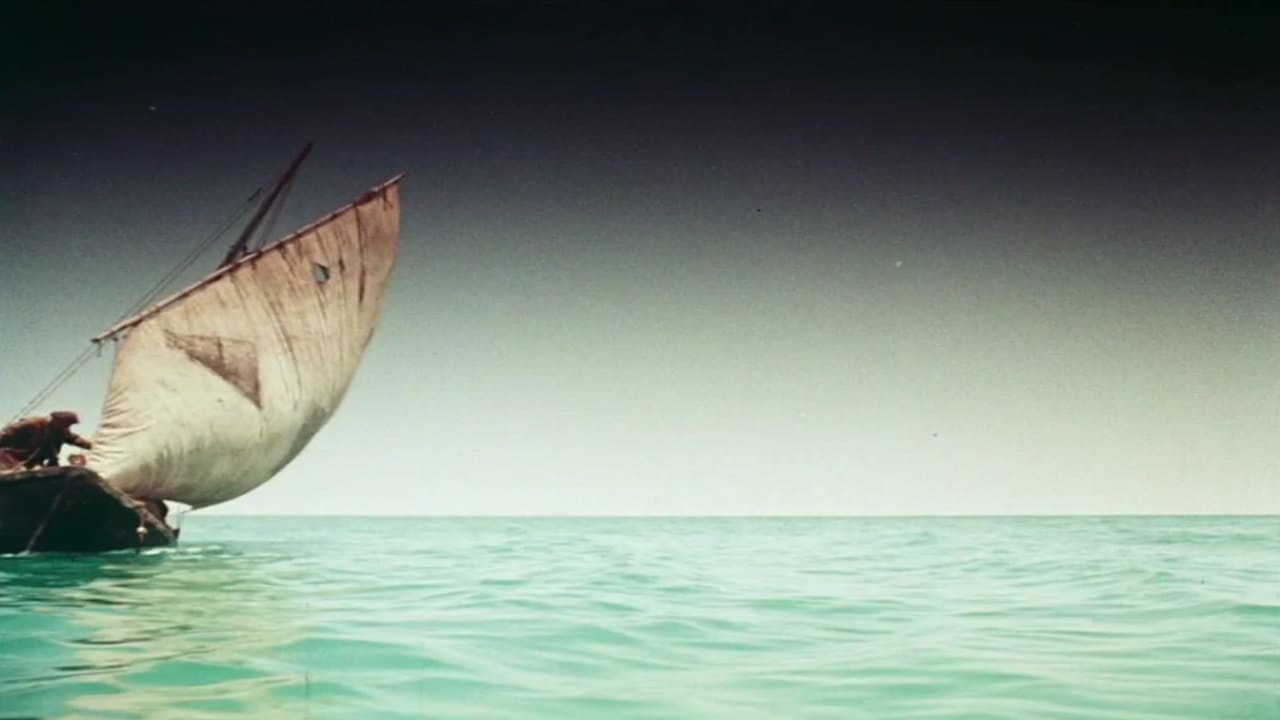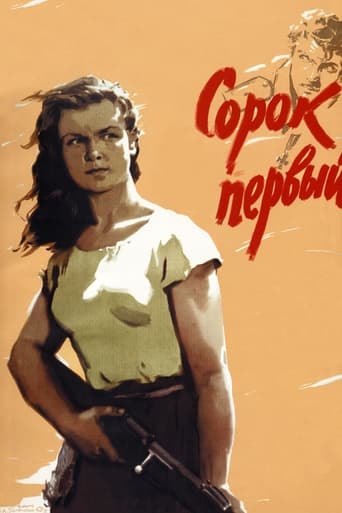

Well Deserved Praise
... View MoreGood story, Not enough for a whole film
... View MoreFun premise, good actors, bad writing. This film seemed to have potential at the beginning but it quickly devolves into a trite action film. Ultimately it's very boring.
... View MoreThe storyline feels a little thin and moth-eaten in parts but this sequel is plenty of fun.
... View MoreThe feature debut of Soviet Union director Grigoriy Chukhray (who would subsequently acquire international fame for BALLAD OF A SOLDIER in 1959, his second feature), THE FORTY-FIRST is a potentially engrossing romance happens in the two warring parties during the Russian civil war, a Red Army sniper Maria (Izvitskaya) and a White Army officer Lieutenant Vadim (Strizhenov).The storyline is straightforward and linear, based on the eponymous novel by Boris Lavrenyev. Maria is among a defeated Red Army unit, leaded by Commissar Yevsyukov (Kryuchkov), she is a marks-woman, who has already claimed forty lives of her enemies. On their route to retreat in Karakum Desert, the group captures Vadim, aka. the titular forty-first which miraculously survives Maria's bullet, who is carrying a secret oral message to a White Army general, so they keep him as a captive and the Commissar puts him under Maria's guard. When they finally arrives at the Aral Sea, Maria and two other soldiers are entrusted to take Vadim on a boat to their headquarter in Kazaly, but stormy weather causes the boat stranded on a nameless island, and only Maria and Vadim have survived. The seclusion becomes a hotbed for their mutual affection which has engendered throughout their journey to bloom, Maria's nurturing nature, her passion for writing verses and aspiring to acquiring further education and Vadim's erudite knowledge, his "dangerous" blue eyes, bring them closer, not as sworn enemies, but two tender souls, a scintillating paragraph, where they finally embrace and smooch, after Vadim tells her the story of Robinson Crusoe and jokes that she is his "Man Friday". They share the most joyous time on the island, in spite of their ideological disparity of war and life, it is something they must adjust and reconcile for the sake of their love, and at one time, it seems working, they are frank to each other and decide to face the uncertain future together, a happy-ending beckons when a boat is approaching to rescue them, but the climax arrives so abrupt and emotionally manipulative in the coda, when the true identity of the boat is revealed, Maria's almost spontaneous reflex brings a poignant doom to the pair of star-crossed lovers, echoes the portentous title.From the gaping geographical shifting, starts in the desert, to the choppy Aral Sea, terminates on the isolated island, perpetually under an indigo shade, Chukhray emerges as a staunch craftsman in grappling with the diversity of locations, also revels in bestowing an ethnographic touch with its disinterested depiction of Auls people. More bracingly, considering it time, the film is pluckily against the grain of the propaganda exploitation in the Soviet industry at then, humanises the image of a White Army officer, and inspires audience to empathise the genuine affection regardless of their political beliefs, even though the ending could be read as a heroic feat of the loyalty to the Red Army, more resoundingly yet inconspicuously, one cannot help but becoming cognizant of the detrimental power which a radical code of belief can afflict on its subject, to brainwash them, to call on unconditional sacrifice with no bottom-line. Rather than arguing whether the Red or the White serves as the object of Chukhray's admonition, it seems to me, the real deal is the war itself, a diabolical act disguised as a manifestation of patriotism with disastrous outcome, but in essence, only capitalised on by those few warmongers for some elephant-in-the- room self-serving interests, yet, the same thing continues to repeat itself, again and again, no end is in sight. As for the film itself, my admiration is ample and well-grounded.
... View MoreQuite a filmmaker this Chukhrai was. Not much available from him, but I am happy to have seen two of his movies. "The Forty-first" perhaps wasn't as great as the wonderful "Ballad of a Soldier", but this is still quite an interesting film. Both of these films are war films, but contrary to what one might expect these films are told in a rather romantic, light-hearted, Hollywood style. Both films do have tragic elements which present themselves as the films progress, but they are largely rather light and enjoyable, even charming romance pictures of loved ones being torn apart and doomed by war. This story was started here with "The Forty-first" and would be perfected in "Ballad of a Soldier".The script isn't particularly strong here, but where this film really stands out is in its visuals. An utterly stunning visual work from Chukhrai. I'm not sure I have seen a color film look like this one before! You have to see it to understand. Additionally, it's just constantly a visually dynamic film in Chukhrai's camera-movement and use of close-ups. The film is at the very least continually visually interesting and at its peak just stunning to look at. There's a really rich, dreamy atmosphere that develops by the end of the movie, and it makes for a quite unique viewing experience.The ending is both quite outlandish but also tragic. Not too sure what to completely make of it. Then again, this was never a film which really strived for any kind of realism, so its over the top nature isn't too jarring with the rest. Actually, the more I think about it, the more I like it.
... View MoreWatching this I was reminded of Hollywood Westerns of the mid-1950s, with the saturated color and framing of faces for psychological effect. The constant orchestral score was sometimes unnecessary and somewhat annoying; but as an interview with the director points out, the idea wasn't a grim war story, or even a political screed, but a love story, where sweeping music isn't out of place; and this is a love story. The scenes with the nomads are striking and unforgettable; the desert sequences are also memorable, as is most of the film. Much of the acting could be considered somewhat overwrought, with people flinging themselves down on the ground and making exaggerated gestures, so much so it almost seemed a modernized film with silent movie performances. For those unfamiliar with the original novella, it may not matter, but the movie stays quite close to the story. Honestly, this movie does seem dated, but is well worth the time for several scenes of honest beauty and some decent-enough acting performances. And, I have to admit, while I watched the majority of the film with more or less dispassionate interest, I was unprepared for the rifle shot at the end. It's much, MUCH more shocking than I expected, and if only for that reason, this movie sticks in my head.
... View MoreOne of the very best films of Soviet cinema,has little propaganda and a lot of sentiment, in a story that takes place during the soviet revolution. Boy meets girl, in the worst possible time, although, it is the war that unites them. They belong in different sides, but the new era makes their love possible. But duty comes before love in the Soviet cinema, so the end is sad but beautiful, and actually you can't imagine the film with a different ending. I don't want to forget that the cinematography is perfect and the artistic direction of the best kind. One of my favorites!
... View More